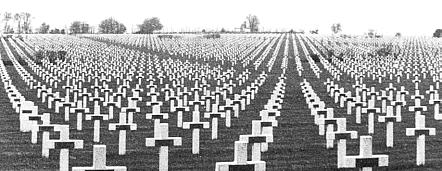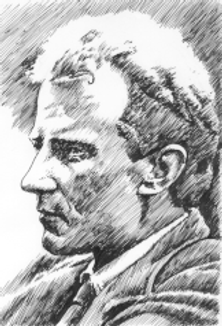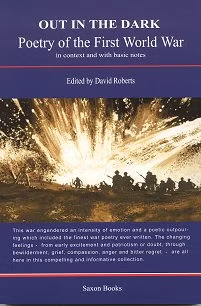The War Poetry Website
Poems of the
First World War
On this page (links)
-
Wilfred Owen's Anthem for Doomed Youth (with useful notes for students)
-
Here Dead We Lie - A E Housman
-
This Is No Case of Petty Right or Wrong - Edward Thomas
-
Peace - Rupert Brooke
-
1914 - Wilfred Owen
-
Apologia Pro Poemate Meo - Wilfred Owen
On other pages
For Owen's Dulce et Decorum Est and information and analysis of Owen's ideas click the Wilfred Owen drop-down menu above.
ANTHEM1 FOR DOOMED YOUTH
By Wilfred Owen
(with numbered notes)
What passing-bells2 for these who die as cattle?
Only the monstrous anger of the guns.
Only the stuttering rifles' rapid rattle
Can patter out3 their hasty orisons.4
No mockeries5 now for them; no prayers nor bells;
Nor any voice of mourning save the choirs, –
The shrill, demented6 choirs of wailing shells;
And bugles7 calling for them from sad shires.8
What candles9 may be held to speed them all?
Not in the hands of boys but in their eyes
Shall shine the holy glimmers of goodbyes.
The pallor10 of girls' brows shall be their pall;
Their flowers the tenderness of patient minds,
And each slow dusk11 a drawing-down of blinds.12
Written September - October, 1917
Notes for students
1 Anthem - perhaps best known in the expression "The National Anthem;" also, an important religious song (often expressing joy); here, perhaps, a solemn song of celebration
2 passing-bells - a bell tolled after someone's death to announce the death to the world
3 patter out - rapidly speak
4 orisons - prayers, here funeral prayers
5 mockeries - ceremonies which are insults. Here Owen seems to be suggesting that the Christian religion, with its loving God, can have nothing to do with the deaths of so many thousands of men
6 demented - raving mad
7 bugles - a bugle is played at military funerals (sounding the last post)
8 shires - English counties and countryside from which so many of the soldiers came
9 candles - church candles, or the candles lit in the room where a body lies in a coffin
10 pallor - paleness
11 dusk has a symbolic significance here
12 drawing-down of blinds - normally a preparation for night, but also, here, the tradition of drawing the blinds in a room where a dead person lies, as a sign to the world and as a mark of respect. The coming of night is like the drawing down of blinds.
Notes from Out in the Dark - Poetry of the First World War in Context edited by David Roberts. Copyright © David Roberts 1998. Free use by individual students for personal use only.
Why did young men volunteer to fight in the First World War? Did they have any doubts?
HERE DEAD WE LIE
by A E Housman
Here dead we lie
Because we did not choose
To live and shame the land
From which we sprung.
Life, to be sure,
Is nothing much to lose,
But young men think it is,
And we were young.
A E Housman

THIS IS NO CASE
OF PETTY RIGHT OR WRONG
by Edward Thomas
This is no case of petty right or wrong
That politicians or philosophers
Can judge. I hate not Germans, nor grow hot
With love of Englishmen, to please newspapers.
Beside my hate for one fat patriot
My hatred of the Kaiser is love true: –
A kind of god he is, banging a gong.
But I have not to choose between the two,
Or between justice and injustice. Dinned
With war and argument I read no more
Than in the storm smoking along the wind
Athwart 1 the wood. Two witches' cauldrons roar.
From one the weather shall rise clear and gay;
Out of the other an England beautiful
And like her mother that died yesterday.
Little I know or care if, being dull,
I shall miss something that historians
Can rake out of the ashes when perchance 2
The phoenix 3 broods serene above their ken.
But with the best and meanest Englishmen
I am one in crying, God save England, lest
We lose what never slaves and cattle blessed.
The ages made her that made us from dust:
She is all we know and live by, and we trust
She is good and must endure, loving her so:
And as we love ourselves we hate her foe.
26 December, 1915
Notes
1 athwart - across
2 perchance - perhaps
3 phoenix - legendary bird that was able to grow again from its own ashes
Edward Thomas wrote THIS IS NO PETTY CASE OF RIGHT OR WRONG after a blazing row with his father who was a conventional patriot who demonised the Germans.
Contrast
The poem is truly patriotic, and is an interesting contrast with the patriotic war poems of Rupert Brooke.
PEACE
by Rupert Brooke
This is the first of his sonnets in the 1914 sequence
(with notes)
Now, God be thanked Who has matched us1 with His hour,
And caught our youth, and wakened us from sleeping,
With hand made sure, clear eye, and sharpened power,
To turn, as swimmers into cleanness leaping,
Glad from a world grown old and cold and weary,
Leave the sick hearts that honour could not move,
And half-men, and their dirty songs and dreary,
And all the little emptiness of love! 2
Oh! we, who have known shame, we have found release 3 there,
Where there's no ill, no grief, but sleep has mending,
Naught broken save 4 this body, lost but breath;
Nothing to shake the laughing heart's long peace there
But only agony, and that has ending;
And the worst friend and enemy is but Death.
Notes
1 matched us - made us suitable to take part in these thrilling times
2 emptiness of love - Brooke was disillusioned with love. He had a stormy relationship with Katherine Cox which led to a nervous breakdown. Other relationships with young women were never lastingly satisfactory.
3 release - relief, a sense of freedom
4 save - except
All of Brooke's war sonnets appear in both Out in the Dark and Minds at War. Only Out in the Dark has notes on the poem. Minds at War has a good deal of biographical information about Brooke including extracts from his letters.

Edward Thomas
Rupert Brooke
Owen's Changing Opinions
What did Wilfred Owen think about the war at the beginning and how did his views change by the end?
Especially at the end his views were very mixed and complicated, but here are two poems, an early and a late one, that give us some idea of his thinking. But first a letter that he wrote to his mother.
Wilfred Owen's letter to his mother
'The Daily Mail speaks very movingly about the “duties shirked” by English young men. I suffer a good deal of shame. But while those ten thousand lusty louts go on playing football I shall go on playing with my little axiom:- that my life is worth more than my death to Englishmen.'
2nd December 1914
1914
By Wilfred Owen
War broke: and now the Winter of the world
With perishing great darkness closes in.
The foul tornado, centred at Berlin,
Is over all the width of Europe whirled,
Rending the sails of progress. Rent or furled
Are all Art's ensigns. Verse wails. Now begin
Famines of thought and feeling. Love's wine's thin.
The grain of human Autumn rots, down-hurled.
For after Spring had bloomed in early Greece,
And Summer blazed her glory out with Rome,4
An Autumn softly fell, a harvest home,
A slow grand age, and rich with all increase.
But now, for us, wild Winter, and the need
Of sowings for new Spring, and blood for seed.
Drafted in southern France in late 1914.
An extract from a poem Wilfred Owen wrote
at the end of 1917
APOLOGIA PRO POEMATE MEO *
(First two stanzas)
I, too, saw God through mud, -
The mud that cracked on cheeks when wretches smiled.
War brought more glory to their eyes than blood,
And gave their laughs more glee than shakes a child.
Merry it was to laugh there -
Where death becomes absurd and life absurder,
For power was on us as we slashed bones bare
Not to feel sickness or remorse of murder.
Written November/December 1917.
* Apologia pro poemate meo - Justification for my poetry.
These poems and 26 more of Wilfred Owen's poems appear in Minds at War.
In Out in the Dark these poems appear with 17 more of his poems.
